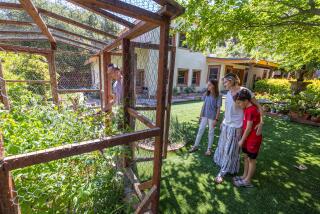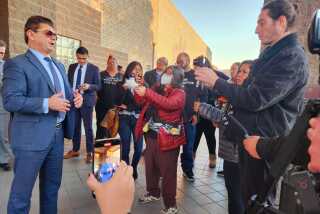SUV Vandalism Figure Takes Case to the People
- Share via
It has been more than four months since authorities arrested and released Josh Connole for allegedly trashing dozens of sport utility vehicles across the San Gabriel Valley.
Since then, the 25-year-old Pomona activist has been wowed by the notoriety that goes along with making the national news. But mostly, he has been fighting to clear his name.
On Sunday, dozens of activists visited Connole’s home, an eco-friendly Pomona housing cooperative, to attend a conference on sustainable living. At a speech in one of the co-op’s living rooms, Connole proclaimed his innocence, solicited donations for his legal fees and showed support for his lawyer’s contention that he is a victim of a U.S. Justice Department that needs a “remedial course” in the Bill of Rights.
“I think the FBI should have to defend their actions, instead of me having to hire an attorney to defend my actions,” said Connole, adding that he believed he was targeted for his environmental and antiwar activism -- an assertion that the FBI has denied. “It’s not [just] about Hummers.”
Federal prosecutors said the Aug. 22 incident, which caused an estimated $3.5 million in damage, remained under investigation. Although the FBI would not say Sunday whether Connole was still a target of their inquiry, West Covina police said after his Sept. 15 release that Connole remained a suspect. They would not comment Sunday. Connole was never charged.
In mid-September, a man who claimed membership in the Earth Liberation Front, a group whose initials were painted on some of the SUVs, told The Times that Connole was not involved.
Connole’s attorney William Paparian has filed a complaint with the Department of Justice, alleging that Connole’s civil rights were violated. On Oct. 1, he filed a notice of intent to sue the city of West Covina and said he plans to sue West Covina police and the federal government in civil court. A federal judge may soon consider Paparian’s motion demanding the unsealing of affidavits in support of warrants to search Connole’s quarters and the premises of his associates.
“We think when someone’s been wrongfully arrested and had their reputation smeared as a terrorist, they have a right to know why the government arrested them,” Paparian said.
In his presentation Sunday, Connole casually recounted the details of his arrest.
Court records showed that federal officials had received information about Connole’s alleged role in the SUV incident from an anonymous informant. Connole said he first noticed something was awry about a week and a half after the vandalism, when a black Mustang began tailing the poky electric cart that co-op members use to run errands.
Connole was eventually arrested by federal agents at gunpoint in front of the co-op, but he said he was still unclear what he was being targeted for. At one point, he said, he figured it had something to do with his opposition to the Iraq war.
“It was really creepy to me,” he said. “I had no idea what was going on.”
Some in the audience figured that the FBI simply got the wrong man. But others said they were concerned that federal officials were targeting activists who opposed the country’s domestic and foreign policies.
“It sounds like the kind of thing they’ve been pulling since the ‘60s,” said Jerry Hoffman, 51.
At one point, officials served a search warrant at the co-op, seizing other residents’ personal items. Most have been returned.
Despite his new struggle to cope with “this weird celebrity thing,” Connole seemed to have returned to his old routine at the co-op.
The list of chores showed him responsible for cooking dinner Thursday, taking out the recycling and cleaning the first-floor bathroom. He also has continued his job at a solar panel company owned by one of the co-op members.
Friends said he had been acting the same as always. In an interview, he launched into a spirited discussion of the inequalities between the country’s rich and poor, saying he was attracted to elements of communism, socialism and capitalism. Nearby, guests sat around the co-op’s vegetable garden, sampling organic dishes from a potluck supper.
But there were signs that all was not well.
They were posted on the front door -- and warned government officials not to enter without a warrant.
More to Read
Sign up for Essential California
The most important California stories and recommendations in your inbox every morning.
You may occasionally receive promotional content from the Los Angeles Times.













